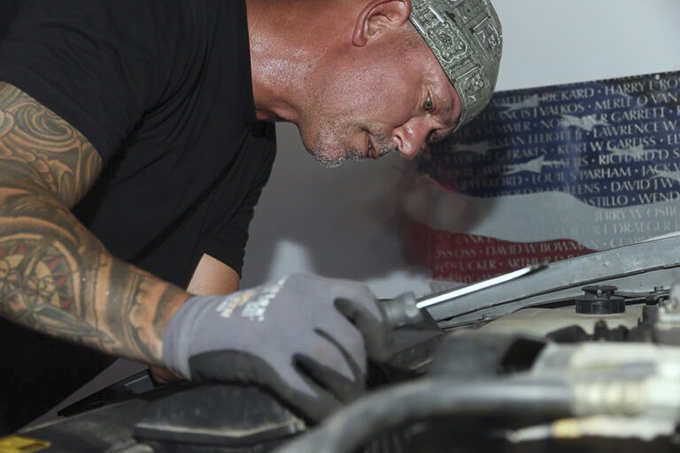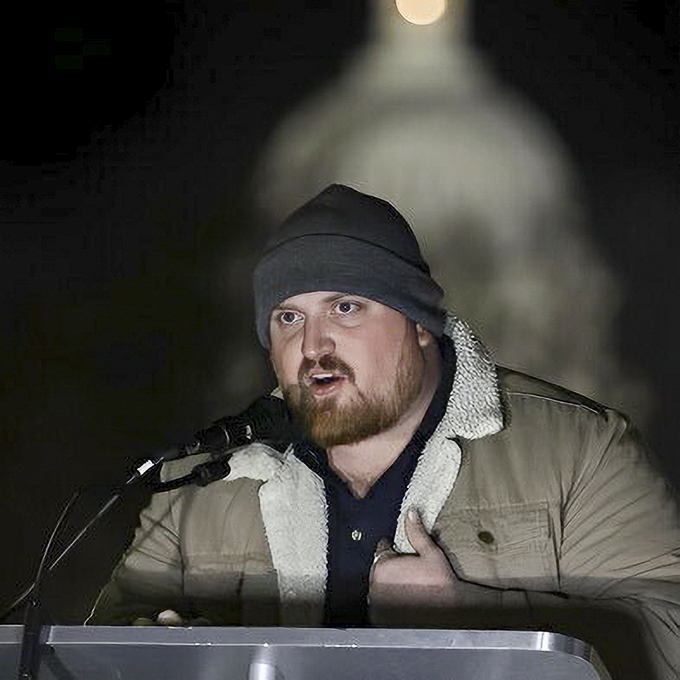In W. Va. and Nebraska: Can Two Working Class Candidates Crash a Multi-Millionaire’s Club in Washington, DC?
By Steve Early
Both major parties on Capitol Hill like to boast about how much more “representative” their Congressional delegations have become in recent years. But that’s only in the most discussed categories of diversity—such as race, age, gender, ethnicity, or sexual orientation. Working class Americans rarely end up in the halls of Congress. Fewer than two percent of Congress members had working class jobs at the time they were elected.
Two working class candidates hope to improve those numbers next year, by winning U.S. Senate seats in Nebraska and West Virginia, states currently represented by anti-labor politicians, but which were once bastions of a more populist, pro-worker politics.

In Nebraska, Dan Osborn is challenging two-term Republican Deb Fischer. Osborn is a steamfitter from Omaha who helped lead a successful strike by 1,500 Kellogg’s workers. They shut down plants in four states for 11 weeks in 2021.

In West Virginia, Zach Shrewsbury is also running for Senate. He’s a military veteran (as is Osborn) and a community organizer, and the grandson of a coal miner. Shrewsbury hopes to replace multi-millionaire Joe Manchin and prevent governor Jim Justice, a billionaire coal baron, from claiming the seat that the corporate Democrat is vacating.
Populist Voices
In their respective campaign launches this fall, both candidates sounded themes once familiar to voters in their home states in the heyday of progressive populism, but not heard much lately.
While picketing with General Motors workers in Martinsburg in October, Shrewsbury explained that he’s “running to win and show that working class people can run for office, even high office. We can’t be ruled by the wealthy elite who don’t understand everyday American life.”
At a campaign kick-off event in late September, Osborn denounced “the monopolistic corporations… that actually run this country” and pledged to “bring together workers, farmers, ranchers and small business owners across Nebraska around bread-and-butter issues that appeal across party lines.”
Unlike Shrewsbury, who plans to compete next year’s Democratic primary, Osborn is currently collecting the 4,000 signatures necessary to get on the November 2024 ballot as an independent. He hopes to avoid unhelpful association with the national Democratic Party in a state which chose Donald Trump over Joe Biden by 19 points in 2020 (and Trump over Hillary Clinton by an even larger margin four years earlier).
Osborn admirers in Nebraska unions, and even the state Democratic Party, believe his non-partisan stance may be helpful. According to Jeff Cooley, a railroad union official who leads the Midwest Nebraska Central Labor Council, Osborn’s focus on issues like rail safety and the PRO Act, paid leave time, minimum wage increases and misclassification of workers as independent contractors “offers hope to all workers in Nebraska regardless of political party.” Osborn’s platform also highlights the need to curb corporate misbehavior ranging from routine consumer rip-offs to Big Pharma price gouging and monopolistic practices in the meat-packing industry which favor big agriculture over small family farmers and ranchers.
A Troubled Brand
Jane Kleeb, a past Bernie Sanders delegate who chairs the Nebraska Democratic Party and serves as an Our Revolution board member, told the local media “it would be very interesting for Democrats, Libertarians, and Independents to all come together with the one goal of breaking up the one-party rule at the top of the tickets in our state.” She acknowledged to Labor Notes that, at the moment, “the brand of the Democrats is not the best when it comes to working class and communities of color voters.” Meanwhile, in rural communities like her own, “people think Democrats are wimpy, just want to tax us, and take away our guns.”
Neither Osborn nor Shrewsbury look or sound very wimpy. Before going to work for Kellogg’s as an industrial mechanic and becoming president of Bakery, Confectionary, Tobacco Workers and Grain Millers Local 50G, Osborn served in the Navy and two state national guard units. Shrewsbury was in the Marine Corps for five years. After his discharge, he joined Common Defense to rally fellow veterans against what that group calls “Trump’s corrupt agenda of hate” and “the entrenched power of greedy billionaires who have rigged our economy.”
Shrewsbury has been an organizer for Citizen Action and the New Jobs Coalition, where he met retired AFL-CIO organizing director Steward Acuff, now a resident of West Virginia. Acuff hopes to enlist national union backing for Shrewsbury’s campaign. The two of them bonded while canvassing to build grassroots support for federally-funded green jobs, environmental clean-ups, and infrastructure projects employing union labor. Acuff believes that Shrewsbury is uniquely equipped to challenge the “corporate colonialism that is still robbing a people and their state of much-needed resources.”
Shrewsbury wants to use his campaign “to help revitalize labor here and everywhere, like Bernie did.” Like Sanders, who won West Virginia’s Democratic presidential primary in 2016, Shrewsbury isn’t afraid of being red-baited either. “If caring about working-class people, caring about people having bodily autonomy, water rights, workers’ rights, makes you a socialist, then call me whatever you want. Doesn’t bother me,” he told The Guardian recently.
Fundraising Disadvantage
Osborn has raised more than $100,000 in small donations so far. Next November, Nebraska voters will also consider a ballot measure backed the Nebraska State Education Association. It would repeal the Republican-dominated state legislature’s authorization of a tax scheme that threatens financing of public education and aids private schools instead.
Osborn favors repeal, further illustrating what Kleeb calls “a real contrast between Dan and Deb Fischer,” who has built a $2.7 million re-election campaign war-chest. According to Fischer’s website, her top donors include “fellow Senate Republicans, the American Israeli PAC, the construction industry and defense contractors.”
Osborn believes that his Senate race could be “the most viable independent campaign in America” next year, particularly if Nebraska’s Democratic primary produces no serious competition for Fischer’s seat. Meanwhile, he is spending 40 hours a week doing boiler maintenance and repair work at Boys Town in Omaha, as a member of Steamfitters and Plumbers Local 464.
Osborn hopes to take more time off, from his day job soon to campaign around the state, with backers like Nebraska Railroaders for Public Safety. This advocacy group just conducted a favorable poll and then endorsed him.
Their survey of 1,048 likely voters revealed considerable discontent with Fischer, who promised to serve only two terms but is now seeking a third. Despite Osborn’s lack of name recognition, he had a slight lead over Fischer, which grew larger when survey participants were informed about the biographies and positions of both candidates.
The Nebraska Railroaders are taking that as an encouraging sign that their state still has an independent streak that could help “elect a next-generation representative of the working class instead of continuing to send out-of-touch millionaires back to Washington to fail us.”
…
Editor’s note:
Shewbury has put out a statement regarding the war being waged in Gaza between Hamas and Israel – it is included below.
“Hear me out. This email will be a bit long, but I need to share this with you.
I did not grow up in an environment where conversations about Israel and Palestine were commonplace. We were a working-class family in a small community, and foreign policy issues were not frequently discussed. We were neither Jews nor Arabs. My family has been in West Virginia for centuries, and our world was insulated. I didn’t have access to the kind of liberal arts education where history is examined from different perspectives. In the Marines, my training did not include a deep dive into the events that led to Nakba in 1948, which, by the way, means “the catastrophe” in Arabic.
I am from the same cloth as most Americans; I am a working West Virginian.
As a future U.S. Senator, I’m dedicated to deepening my knowledge and understanding of current events’ historical and legal context because the responsibility to and the influence this country has over millions of people in faraway lands is enormous. I don’t take this power lightly.
Our media industry often sensationalizes terms like war, self-defense, and human shields to mold public opinion toward the monied interests of their advertisers and influential stakeholders and the system that allows them to rake in incredible profit at the expense of truth and balanced reporting. As I broaden my context, I’m learning what these terms mean under the International Human Rights Law that we as a country claim to support and yet so rarely honor.
· The term “war” is used intentionally to create the impression that what is going on between Israel and Palestinians is a conflict between two autonomous states. That cannot be further from the truth, as Israel is the occupier, and Hamas is the governing body of the occupied territory but not a sovereign government.
· Israel has obligations under international law to provide services and ensure the safety of its occupied population. On October 7th, when Hamas attacked, they had the right to use police powers to apprehend the criminals and prosecute them but not to use their massive military might against an essentially defenseless people. We cannot use the “right to defense” language describing Israel’s revenge that has so far killed approximately 18,000 Palestinians, two-thirds of whom are women and children.
· In the context of international law, using human shields means actually putting a civilian in front of a military vehicle or combatants while advancing on the enemy. It doesn’t mean having combatants living or even operating in the areas civilians occupy. Using human shields is a war crime. Israel uses the human shield argument to justify their illegal, immoral, massive-scale attacks on civilians and civilian infrastructure. Israel wants to drive the Palestinians out of Gaza.”
…